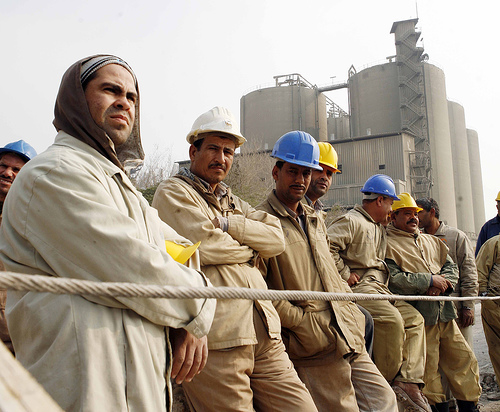
Social protests and labor strikes have escalated to unprecedented levels in Egypt since the January 25 uprising. In recent months, workers have staged hundreds of protests spanning almost all industrial and service sectors in Egypt. Although labor activism has been on the rise since the revolution, the surge in labor protests actually started before the revolution, with approximately 266 protests in 2006, 614 in 2007, 630 in 2008 and 609 in 2009. This explosion of labor activism was a natural result of the economic policies established during Ahmed Nazif’s government beginning in 2004, which promoted growth at the expense of social justice, and led to growing economic inequality.
Taking a step back from the protests, the following question needs to be asked:
Why have thousands of workers chosen to express themselves through protests movements outside of any institutional framework and what can be done to address their demands? The answer, I will argue, lies in implementing a draft law on trade unions that the Ministry of Manpower has been working on for several months.
Identifying the cause of the rise in labor protests over the past decade is very simple: Workers felt that the institution that was supposedly representing their interests under Mubarak’s rule, the state-run Egyptian Trade Union Federation (ETUF), was actually defending the interests of the regime. In a partial concession to the labor movement, the interim government has agreed to dissolve ETUF’s board, but the institution continues to function. In an effort to circumvent state regulation of the labor movement, union leaders announced the establishment of Egypt’s first independent federation of trade unions in March 2011. Increasingly, workers are looking to their own trusted leaders to negotiate on their behalf. As labor unions become increasingly independent and assertive, it will become necessary to institutionalize the negotiation process between workers on the one hand and government or private sector businessmen on the other, if Egypt is to achieve a successful democratic transition. In other words, we need to formulate a new social contract acceptable to both workers and the state, something that requires the presence of institutions that are truly representative of the labor movement.
It is worth looking to the examples of Spain and Portugal, which during their own democratic transitions witnessed hundreds of social protests similar to those Egypt is seeing today. Unlike Portugal, where sustained demonstrations had a destabilizing effect on the transition, Spain’s government was able to maintain its legitimacy by negotiating with politicians, parties and trade unions a plan for managing the economy throughout the transition. By accommodating workers demands’ with the consensus agreement known as the “Moncloa Pact,” Spain’s leaders kept the democratic transition on track.
Is there an equivalent of the Moncloa Pact that would help resolve Egypt’s labor crisis?
In my opinion, issuing the new Trade Union Law, which was prepared by the Ministry of Manpower a few months ago but has not yet been ratified by the SCAF, is an immediate necessity and would guarantee the credible representation that workers are seeking in the following ways:
- Allowing trade union pluralism by replacing the 1976 Trade Union Law No. 35, which required unions to join the umbrella state-regulated labor federation, ETUF.
- Guaranteeing the right of workers to form trade unions without undue administrative or bureaucratic obstacles, by denying the Ministry of Manpower the right to reject applications for establishing new unions (as was commonplace under Mubarak’s rule).
- Protecting the right of workers to form their own unions without being subjected to intimidation or pressure from their employers. This reform is essential to shield workers from retaliation, particularly in the private sector, where labor leaders who try to form unions have historically faced harassment or other punishment.
- Allowing workers to withdraw from national trade federations without forfeiting the savings-and-fellowship funds to which ETUF members are entitled. Under Mubarak’s rule, the ETUF administration tried to regulate and contain the labor movement by witholding the financial benefits from members who left the federation to try to form independent unions.
- Guaranteeing autonomy for trade unions from administrative and financial oversight by employers and the government, a major feature of the Mubarak-era regulatory framework, in which the Ministryof Manpowerhad sweeping powers to intervene in the affairs of labor unions.
Issuing a new trade union law is an urgent and necessary step toward achieving a representative democracy and social justice. After decades of government oversight and intervention in the labor movement, Egyptian workers need a legal framework to support the development of unions that are truly independent and responsive to the interests of their members. Egypt desperately needs a new social contract to protect both the political rights of citizens and the economic rights of workers. Any further delay in implementing the draft law on trade unions could hinder the establishment of this new social contract, increasing the strain on Egypt’s already fragile economy and jeopardizing the success of the transition process as a whole.
Nadine Abdalla is a Research Fellow at the Arab Forum for Alternative Studies (AFA) in Cairo and columnist for the independent daily newspaper Al-Masry al-Youm. Her research interests include trade unions and labor movements in the post-Mubarak era.
Photo credit: Bikya Masr
Image: Workers%20protest.jpg
